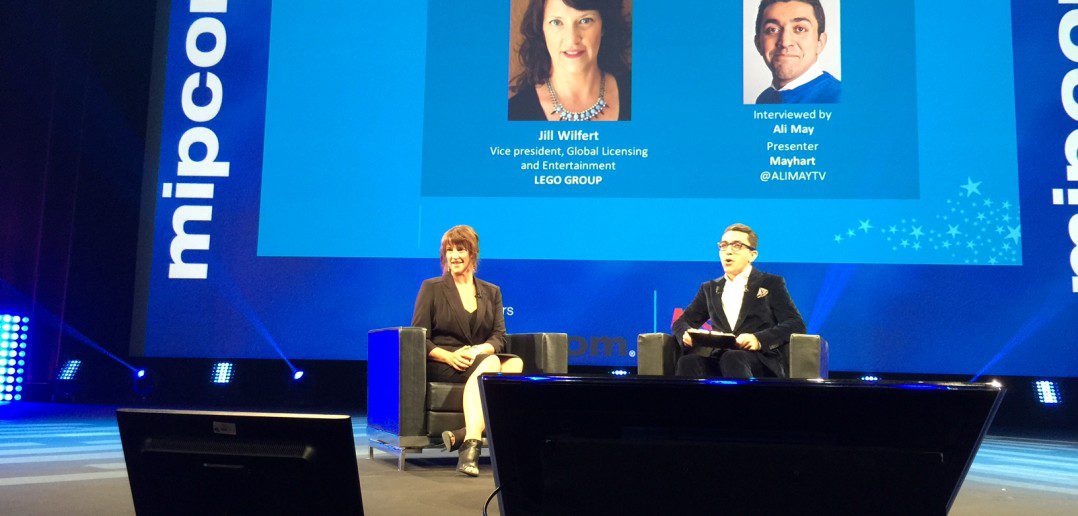There is no such thing as an overnight success, noted Ali May as he introduced the third Media Mastermind keynote of MIPCOM today: Lego’s vice president of global licensing and distribution Jill Wilfert. May proceeded to interview her about how the company reaches children through toys, TV shows, its critically-acclaimed film and digital media.
What gave Lego the confidence to dip its toe in the content waters originally? She said working with properties like Star Wars and Harry Potter helped Lego realise that adding stories and characters was driving play. « And people were demanding it! » she said, noting that people were using Lego in their own YouTube videos in hugely creative ways. « People were creating fabulous content, and we were really inspired by that, » she said. « So we started off creating shorts, which were really well received, then one TV special, then two TV special, then a series and it’s culminated this year with the Lego Movie. »
How important is the content side to Lego’s business now? « The audience has responded, they love our content, » she said. « It’s not been so much about developing this as a separate business that is going to drive a new revenue stream… really it’s about driving engagement and building the brand. » Although she quickly noted, with a grin to her sales colleagues in the audience, that this doesn’t mean Lego is giving its content away for free.
Wilfert talked about the « strong personal relationship » that people have with Lego, and the way this « There are times when the temptation would be to maybe be a little more edgy, and to go for teenage appeal. But we’ve managed to find the right balance, we’re maintaining really broad appeal, but we’re never inappropriate. » She admitted that Lego « can be a fussy company » when choosing its partners, but only because it always has that brand and relationship with its fans in mind.
Lego is now the largest toymaker in the world, despite having – in May’s words – « barely having touched China ». What are its plans? « We do see Asia as a big priority, and in particularly China. We have established a footprint there, » said Wilfert. « We’re in the process of building a manufacturing plant… Really our strategy there is to be closer to the market so we can react more strongly to the dynamics of the market. »
How quickly can Lego react? « We are pretty methodical about what we do. We do a lot of research and we try to understand kids and how they relate to what we’re doing, » she said. May asked how companies can best pitch Lego. « We are definitely not the company that’s going to be taking the frontrunning position: we are more conservative. We look for the things that have more of a track record, that are tried and true, versus the thing that’s new on the block. »
The conversation turned to The Lego Movie, which was partly inspired by the success of the Transformers movies, although there was still caution internally about whether Lego really did belong in the film business. « We’re a conservative Danish company, » she noted, while adding that a lot of people approached Lego just wanting to do a Lego movie, but didn’t really have good ideas for what it should be like. Warner Bros, the eventual partner, was the one that came forward with something Lego could work with – aided by the fact that the two companies had already worked together around games.
The goal with the movie was that « families could come to the movie, and walk away feeling the creativity of the brand » according to Wilfert. So when is the next movie coming? « There is a lot of speculation about future Lego movies, » she said. A Lego Ninjago film is in production for 2016, and there’ll be another announcement later this week that Wilfert said she couldn’t pre-empt. « I’m pretty confident that we’ll be seeing additional Lego movies in the future. »
Wilfert talked about past tough times for Lego, and how the company brought itself back from that period. « We figured out that we didn’t have to do everything ourselves. In the past, we thought ‘We’re Lego, we have to do it all’, but we’ve found some fantastic partners, » she said. « There are people who are experts out there who we could work with, and who could help us with what we’re hoping to accomplish. »
Where will Lego be moving to in the next fve years? « You’ll continue to see us in this entertainment and content space… We are working on a new property that will launch with a TV series in 2015, and we’re focusing on having real interactivity, » she added: Something for digital natives, where apps are integrated into the whole experience. There’s also a Lego documentary coming next year, and « we are exploring some reality competition show formats, which is new for us: the idea of becoming a master builder is something we think could be quite resonating. »




